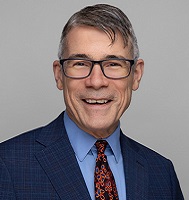 On November 3, the University of Wisconsin Department of Pediatrics welcomed its new chair, John Williams, MD, professor, Division of Infectious Diseases, and the John E. Jr. and Louise A. Gonce Chair in Pediatrics. Williams is the seventh chair to lead the department since it was established in 1957.
On November 3, the University of Wisconsin Department of Pediatrics welcomed its new chair, John Williams, MD, professor, Division of Infectious Diseases, and the John E. Jr. and Louise A. Gonce Chair in Pediatrics. Williams is the seventh chair to lead the department since it was established in 1957.
Williams is an international authority on respiratory viruses, which are leading causes of death in children worldwide. The major focus of his research is the study of human metapneumovirus, or HMPV. Little is known about HMPV, and Williams’ research group works to understand how it infects people, how those infections can be prevented and treated, and important aspects of post-infection immunity.
He has been recognized for his teaching and research accomplishments with numerous awards, including the Society for Pediatric Research E. Mead Johnson Award and the Norman J. Siegel New Member Outstanding Science Award from the American Pediatric Society.
Get to know Williams: Read the UW School of Medicine and Public Health’s news announcement about his selection as chair, view his online profile, visit the J. Williams Research Group webpage, and read the Q&A below.
Hometown: Well, I’ve moved at least 30 times in my life so that’s a tough one. But I lived in the D.C. area for many years, and my dad and sisters are there.
Previous position: Before joining the University of Wisconsin, I was chief of the University of Pittsburgh School of Medicine Division of Pediatric Infectious Diseases.
Why did you choose the field of pediatrics? I’m fond of saying that kids are 20% of the population, but 100% of the future. But the main reason is the joy of caring for kids and learning from them. They complain a lot less than adults and smell better.
What attracted you to UW–Madison? The culture of the institution, the warm people, the exceptional yet humble academic environment, and the lovely town. It’s a fantastic place in so many ways yet kind of flies under the radar.
What are you most excited to start working on as chair? I’m looking forward to meeting the department, recruiting new house staff, growing the clinical enterprise, and expanding research. I love all the missions.
How will you continue your research efforts? I plan to hire a senior scientist to help direct my lab. That said, I have always enjoyed training graduate students and plan to remain actively engaged with my NIH-funded research.
Mentorship has been central to your career as a physician. How will your role as a mentor change when you are chair? Do you have ideas related to mentorship that you hope to introduce to the department? We all need mentoring at all career stages. A primary goal for me as chair is to mentor young faculty to help them succeed in their goals. I also want to continue and build mentoring programs for trainees and staff.
How do you think the role of chair will influence your goals as a physician? My goal as a physician is always to provide the best care I can for the child in front of me. As chair, I need to recruit, train, and support the people who will provide the best care for kids I’ll never meet.
What’s something interesting about your area of expertise you can share that will make us sound smarter during video chats and parties? Bad news and good news. The bad news — our bodies don’t make permanent immunity against respiratory viruses, so colds will never go away, and we can get the same virus over and over. But the good news is that vaccines and prior infections provide enough immunity to lessen severity — so the first time is the worst.
What is the last book you read? A science fiction novel by John Scalzi called Starter Villain.
What is your favorite food? Ice cream.
Do you have a secret talent? I play guitar and have performed in many bands.
What are some of your hobbies and other interests? Hiking, biking, walking, and food.